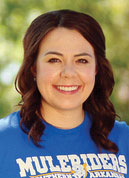 For Taylor McNeel, recently retired National FFA President, a year has brought more knowledge and change than she ever imagined. Taylor, a native of Vilonia, Ark., was a student at Southern Arkansas University in Magnolia when she attended the 2015 National FFA Convention in Louisville, Ky., where she was elected national president. She spent the year traveling the country, as well as visiting Japan, Puerto Rico and the Virgin Islands, far afield from her earliest agricultural memory of riding a horse her grandmother, Mary Lou McNeel, bred especially for her.
For Taylor McNeel, recently retired National FFA President, a year has brought more knowledge and change than she ever imagined. Taylor, a native of Vilonia, Ark., was a student at Southern Arkansas University in Magnolia when she attended the 2015 National FFA Convention in Louisville, Ky., where she was elected national president. She spent the year traveling the country, as well as visiting Japan, Puerto Rico and the Virgin Islands, far afield from her earliest agricultural memory of riding a horse her grandmother, Mary Lou McNeel, bred especially for her.
Taylor started with horses and rabbits in 4-H, and moved to on to show pigs and both Boer and market goats in FFA, where she also competed in prepared speeches on policy issues such as the Farm Bill.
“My parents have always been supportive and behind me rather than trying to lead me where they thought I should go,” Taylor said.
An experience like Taylor’s provides a wealth of personal learning. One aspect of that was a new awareness of the diversity among the FFA chapters and projects as she traveled across the country visiting numerous local chapters.
One chapter in Missouri had only five members, while others such as the Chicago High School for Agricultural Sciences and John Brown High School in Queens had 600 each. Projects were equally diverse ranging from all aspects of the school farm to raising reptiles and rodents.
“Everyone can find a place and passion because agriculture connects us as people,” Taylor said. “All projects, no matter what they are, look toward feeding the world and educating the public.”
Meeting with sponsors like John Deere, Case IH, Monsanto and Zoetis, as well as related farm tours, has added to Taylor’s newer and deeper understanding of agriculture. She viewed new technologies at work and saw the forefront of continuing research.
Taylor saw a robotic dairy farm in Minnesota, where cows wear transponders so a computer knows which cow is choosing to be milked. This information selects the proper container for that milk such as production milk, milk with colostrum, and milk from a cow that has been treated for an illness or injury. Each cow receives an exact amount of grain based upon its individual milk production. Milk production increases as cows choose when they milk which typically is three times per day as opposed to the typical two, and costs go down as grain is proportioned to each individual cow’s production.
Another new piece of equipment that amazed Taylor is a tractor that needs no driver. This is separate from self driven tractors that needed a driver to make the turns so the tractor is properly lined up for the next run.
Traveling overseas showed Taylor different production methods. While Japan is very dependent on the US for food, their farmers, with an average of only 5 acres for production, are expert in producing superior products fostered by meticulous care such as turning a watermelon every day so the fruit has no flat side.
Projects varied as much as farms and technology. One student was devising a less expensive drone explicitly for agricultural use while another was measuring protein amounts in cockroaches and crickets to determine protein needs in protein starved areas. Big research companies are not the only ones pushing agriculture forward. Sometimes, the young have the most innovative insights.
Taylor’s experiences led to some significant personal changes.
Obviously Taylor is a leader and she will now actively canvass different opinions because she has learned that one size does not fit all. Another insight relates to the relationship between goals and the journey getting there.
Taylor will still have the same drive, but she has learned to enjoy the journey and small joys such as feeding someone else’s cattle in Missouri to sharing a meal in Japan.
Perhaps the most important personal change is added options in Taylor’s career plans. Doing prepared speeches in FFA moved her interest from being a vet to working in policy.
However, her experience as National FFA President expanded to include government programs, such as being part of the USDA or even international affairs in order to help developing nations better their agricultural practices and production.
Part of her travels included both Puerto Rico and the Virgin Islands, so she saw the potential firsthand. Another way to accomplish that same goal is to teach at the high school or college level to prepare others to do the hands-on work in other countries. All of this means changes in her education plans. She plans on finishing her degree and increasing her exposure to various aspects of agriculture so she can later narrow more efficiently her choice for a master’s degree.
Taylor offered advice for the new officers. First was to keep a journal that the small moments learned were so important. Second was to always remember the people left behind such as family and friends because returning home is possible once only every six weeks. Phone calls, text and pictures are critical and need to be done on a continuous basis. Her third piece of advice was to see being an officer as part of growing rather than a pinnacle never to be exceeded. Taylor quoted McDonald’s founder Ray Kroc: “If you’re green, you’re growing; if you’re ripe, you rot.”







